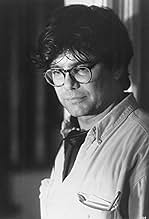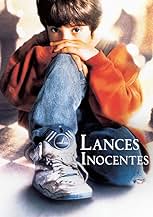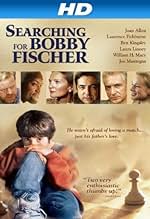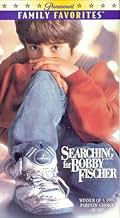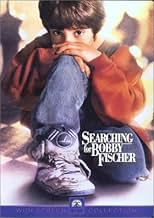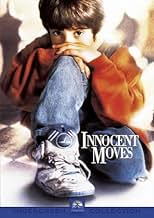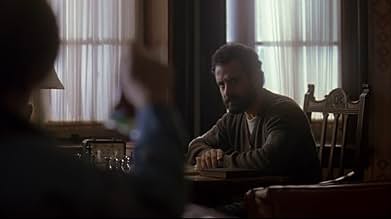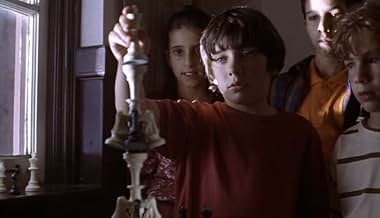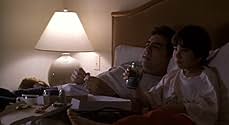Ein präpubertäres Schachwunderkind weigert sich, so hart wie der berühmte Schachspieler Bobby Fischer zu spielen.Ein präpubertäres Schachwunderkind weigert sich, so hart wie der berühmte Schachspieler Bobby Fischer zu spielen.Ein präpubertäres Schachwunderkind weigert sich, so hart wie der berühmte Schachspieler Bobby Fischer zu spielen.
- Regie
- Drehbuch
- Hauptbesetzung
- Für 1 Oscar nominiert
- 6 Gewinne & 11 Nominierungen insgesamt
Empfohlene Bewertungen
***SPOILERS*** The movie "Searching for Bobby Fischer" parallels the lives of Grand Chess Master Bobby Fischer with that of young seven year-old chess prodigy Josh Waitzkin, Max Pomeranc. The movie does it by inserting newsreel footage of Bobby winning the World Chess Championship Tournament in Reykjavik Iceland back in 1972 against the Soviet Unions Boris Spassky. It then jumps back to when Bobby Fischer was a young boy, and man, in the 1950's and 1960's as his obsession with chess brought him the fame and glory that he sought. Yet at the same time denied him the life of a normal boy growing up in post WWII America that his night and day chess fixation cost him.
Josh has lots of promise in becoming a future Bobby Fischer; he has a computer-like mind and a natural ability to foresee moves by his opponents, even before they even know that they'll make them. One thing that Josh doesn't have is that drive and determination, as well as killer-instinct, that Bobby Fisher had and as far as I know still does in playing to win and pulverizing his opponents into the ground by doing it.
Josh likes all kinds of sports, besides chess, and his dad Fred Waitzkin, Joe Mantegna, is a sports writer who takes Josh along to the Yankee and New York Mets baseball games where the young boy really has as much of a good time watching the ball games as he has playing chess. Fred realizes what a whiz his young son Josh is in the game of chess and wants to have him study the finer points of the game by hiring former national chess champion Bruce Pandolfini, Ben Kingsley, to tutor him and Bruce right away realizes that Josh has the makings of another Bobby Fischer. What does bother Bruce about Josh is his playing with the local chess hustlers like Winnie, Laurence Fishburn, in Washington Square Park in Greenwich Village. Which, in Bruce's opinion, is far to fast and doesn't give young Josh time to develop his all around concentration and understanding of the game of chess.
During the course of the movie Josh is driven relentlessly by Bruce in his attempt to mold him into another Bobby Fischer but Josh slowly starts to lose his interest in winning all the chess tournaments that he enters. The very fact of his invincibility makes Josh feel uneasy since it's always expected of him to win, like the sun is expected to rise in the morning, that there's no fun or excitement in it for him any more. Losing becomes more of a growing experience for Josh and even arouses his passions in making him feel more human. Josh is also too sensitive to beat down his opponents, like Bobby Fischer did. That later lost him the championship game against the likewise seven year-old chess phenomenon Jonathan Poe, Michael Nirenberg.
After his defeat to Jonathan Josh is looked on as if he let down all those who believed in him and at the same time he starts to get his life back together as a young boy living a normal life and not carrying the weight of the entire world of chess on his shoulders. It's during this time that the real talent that Josh had in playing chess comes up to the surface, without him being driven relentlessly by Bruce. Those untapped talents leads him to go back to playing chess, first with his friend at the park Winnie, and then working his way back in winning a number of tournaments to his becoming a top chess champion competitor. All that finally earns Josh a re-match with Jonathan for the Junior Chess Championship of the US in Chicago at the conclusion of the film.
Powerful movie and very intense for the young boys and girls in it in how they drive and push themselves to be the best at the game of chess and at the same time putting themselves in danger of sacrificing their one and only childhood to do it.
Josh Waitzkin did reach the top back then when the movie "Searching for Bobby Fischer" was made in 1993 and is still there some ten years, and dozens of tournaments, later. He did it without losing both his childhood and his kind heart and sensitivity for his fellow man by doing it.
Josh has lots of promise in becoming a future Bobby Fischer; he has a computer-like mind and a natural ability to foresee moves by his opponents, even before they even know that they'll make them. One thing that Josh doesn't have is that drive and determination, as well as killer-instinct, that Bobby Fisher had and as far as I know still does in playing to win and pulverizing his opponents into the ground by doing it.
Josh likes all kinds of sports, besides chess, and his dad Fred Waitzkin, Joe Mantegna, is a sports writer who takes Josh along to the Yankee and New York Mets baseball games where the young boy really has as much of a good time watching the ball games as he has playing chess. Fred realizes what a whiz his young son Josh is in the game of chess and wants to have him study the finer points of the game by hiring former national chess champion Bruce Pandolfini, Ben Kingsley, to tutor him and Bruce right away realizes that Josh has the makings of another Bobby Fischer. What does bother Bruce about Josh is his playing with the local chess hustlers like Winnie, Laurence Fishburn, in Washington Square Park in Greenwich Village. Which, in Bruce's opinion, is far to fast and doesn't give young Josh time to develop his all around concentration and understanding of the game of chess.
During the course of the movie Josh is driven relentlessly by Bruce in his attempt to mold him into another Bobby Fischer but Josh slowly starts to lose his interest in winning all the chess tournaments that he enters. The very fact of his invincibility makes Josh feel uneasy since it's always expected of him to win, like the sun is expected to rise in the morning, that there's no fun or excitement in it for him any more. Losing becomes more of a growing experience for Josh and even arouses his passions in making him feel more human. Josh is also too sensitive to beat down his opponents, like Bobby Fischer did. That later lost him the championship game against the likewise seven year-old chess phenomenon Jonathan Poe, Michael Nirenberg.
After his defeat to Jonathan Josh is looked on as if he let down all those who believed in him and at the same time he starts to get his life back together as a young boy living a normal life and not carrying the weight of the entire world of chess on his shoulders. It's during this time that the real talent that Josh had in playing chess comes up to the surface, without him being driven relentlessly by Bruce. Those untapped talents leads him to go back to playing chess, first with his friend at the park Winnie, and then working his way back in winning a number of tournaments to his becoming a top chess champion competitor. All that finally earns Josh a re-match with Jonathan for the Junior Chess Championship of the US in Chicago at the conclusion of the film.
Powerful movie and very intense for the young boys and girls in it in how they drive and push themselves to be the best at the game of chess and at the same time putting themselves in danger of sacrificing their one and only childhood to do it.
Josh Waitzkin did reach the top back then when the movie "Searching for Bobby Fischer" was made in 1993 and is still there some ten years, and dozens of tournaments, later. He did it without losing both his childhood and his kind heart and sensitivity for his fellow man by doing it.
Josh Waitzkin is a regular boy in NYC who quickly picks up the game of chess. He befriends chess hustler Vinnie (Laurence Fishburne) who plays in Washington Square. Josh's parents (Joe Mantegna, Joan Allen) hire chess coach Bruce Pandolfini (Ben Kingsley) who tries to teach him regimented chess. It's a struggle for Josh's heart between his two mentors Vinnie and Bruce.
This is truly a wonderful movie. It is all heart. Max Pomeranc plays it with so much feeling with so few words. I love that he deliberately loses to his father at the start. He's a boy who is trying to grow up and many times, he shows that he's actually the adult in the relationships. Director Steven Zaillian makes so many great moves. And the great actors are all doing their parts. It's a really sweet movie.
This is truly a wonderful movie. It is all heart. Max Pomeranc plays it with so much feeling with so few words. I love that he deliberately loses to his father at the start. He's a boy who is trying to grow up and many times, he shows that he's actually the adult in the relationships. Director Steven Zaillian makes so many great moves. And the great actors are all doing their parts. It's a really sweet movie.
Let me start by saying I am not a person who goes for sentimental, "heart on your sleeve" type big dramas that seem to be the idol of most professional critics. In fact, to put it bluntly I totally loathe them. (I prefer movies that at least try to have a cohesive plot line with a reasonably accessible story idea and some decent tight pacing; ie: something that's both informative and fun. This is my interpretation of the classic idea of "a good story, well told".)
With that in mind, I wish to state that this movie (film, whatever) really does work, at all levels. It's a good intelligent story (apparently based on fact} about a very bright, very young kid who is discovered to be naturally good at chess and enters the serious national tournaments. During which time, there are raised issues of the concept of the winning ethos; and keeping (or losing) your humanity in the process.
This cast is magnificent here. The central leads are played by Joe Mantegna and Max Pomerance as the father and son respectively. Both give very well-balanced performances. Sensitive, without being sappy. Max in particular is very good, especially in the dramatic climax of the film; which he handles with total dignity. It could have been so over the top and patronizing in lesser hands, but this time it isn't.
They are ably supported by Laurence Fishburne and Ben Kingsley as two different types of coaches, from "opposite side of the tracks" (sorry for that old cliché). It may seem formulaic, but in this case the dramatic contrasts works surprisingly well, and both come over as intelligent representatives of their particular points of view. And there are also great character moments by David Paymer {QUIZ SHOW, MR Saturday NIGHT, etc} and Hal Scardino {THE Indian IN THE CUPBOARD} as well.
Over all, I would highly commend this film as the type of story that manages to tread the fine line between intelligent ideas and an entertaining story. I recommend it to everyone. Give it half a chance and it can work for you. It really is a great example of intelligently entertaining!
With that in mind, I wish to state that this movie (film, whatever) really does work, at all levels. It's a good intelligent story (apparently based on fact} about a very bright, very young kid who is discovered to be naturally good at chess and enters the serious national tournaments. During which time, there are raised issues of the concept of the winning ethos; and keeping (or losing) your humanity in the process.
This cast is magnificent here. The central leads are played by Joe Mantegna and Max Pomerance as the father and son respectively. Both give very well-balanced performances. Sensitive, without being sappy. Max in particular is very good, especially in the dramatic climax of the film; which he handles with total dignity. It could have been so over the top and patronizing in lesser hands, but this time it isn't.
They are ably supported by Laurence Fishburne and Ben Kingsley as two different types of coaches, from "opposite side of the tracks" (sorry for that old cliché). It may seem formulaic, but in this case the dramatic contrasts works surprisingly well, and both come over as intelligent representatives of their particular points of view. And there are also great character moments by David Paymer {QUIZ SHOW, MR Saturday NIGHT, etc} and Hal Scardino {THE Indian IN THE CUPBOARD} as well.
Over all, I would highly commend this film as the type of story that manages to tread the fine line between intelligent ideas and an entertaining story. I recommend it to everyone. Give it half a chance and it can work for you. It really is a great example of intelligently entertaining!
One of the best things about "Searching for Bobby Fischer" is that it brilliantly captures the essence of the book it was based on. Fred Waitzkin's book is not just about chess but focuses much on the relationship between a father and his son. The film does exactly the same and the interaction between the actors is handled skilfully by its director. This is without doubt one of the best sports movies I have seen in a while, you feel an intense level of excitement throughout the chess games and there is a great blend of poignancy, humour and serious drama also at play. Ben Kingsley is fantastic as Bruce Pandolfini and his scenes with the young Max Pomeranc are a joy to watch. Max Pomeranc who plays Josh Waitzkin is perfect in the lead role and really shows he is the heart of the movie. Adapting books to films has never been an easy task but this one is probably one of the best adaptations I have ever seen.
Chess is a challenging game that hasn't been given its due in the art of cinema, so it's a pity "Searching for Bobby Fischer", one of the few "chess movies" out there, offers an unconvincing, Hollywoodized treatment of the subject. This is one of those completely conventional, crowd-pleasing entertainments that make everything look too easy (it almost argues that one doesn't need to practice or study to become really good at something, as long as he has a natural gift for it; I'm sure the real Josh Waitzkin would dismiss all that as pure baloney), and rely on a predictable "Rocky"-type final showdown (in this case, against a mean-spirited little chess whiz). Nonetheless, with such a splendid cast (including an excellent performance by newcomer Max Pomeranc), it would be impossible for this film not to have its interesting and affecting moments. (**1/2)
Wusstest du schon
- WissenswertesMax Pomeranc was chosen because he is, in real life, a chess player (or was at the time of this movie). The producers wanted someone who would be at ease and "correctly" playing chess. None of this movie's other stars played chess in the beginning, but eventually Joe Mantegna learned.
- PatzerJosh tells Vinnie he learned the "Schliemann Attack" from his teacher. Actually there's no such thing. It's the Schliemann Defense. Also, when Vinnie asks, "What's that?" referring to the "attack," Josh actually hasn't yet made the move that would prompt him to say this, he's just playing the opening move of the standard Ruy Lopez (1. ... e5), so there'd be no reason for Vinnie to say "What's that?" at that point. The move that makes it "Schliemann" (3. ...f5) hasn't yet been played.
- Alternative VersionenThe original film ends with a title card stating that Josh still plays chess along with several other activities, indicating that he has a well-rounded life. When the film was broadcast on NBC in 1996, this title card was updated: it now stated that Josh was working to become a Grandmaster, and that he now considered Jack Kerouac, not Bobby Fischer, to be his primary influence.
- SoundtracksEnough Is Enough
Written by Anthony Criss, Kier Gist, Vincent Brown, A. Bahr, J Ray
Performed by Rottin Razkals
Top-Auswahl
Melde dich zum Bewerten an und greife auf die Watchlist für personalisierte Empfehlungen zu.
Details
- Erscheinungsdatum
- Herkunftsland
- Sprache
- Auch bekannt als
- Das Königsspiel - Ein Meister wird geboren
- Drehorte
- Produktionsfirma
- Weitere beteiligte Unternehmen bei IMDbPro anzeigen
Box Office
- Budget
- 12.000.000 $ (geschätzt)
- Bruttoertrag in den USA und Kanada
- 7.266.383 $
- Eröffnungswochenende in den USA und in Kanada
- 1.121.354 $
- 15. Aug. 1993
- Weltweiter Bruttoertrag
- 7.266.383 $
- Laufzeit1 Stunde 49 Minuten
- Farbe
- Sound-Mix
- Seitenverhältnis
- 1.85 : 1
Zu dieser Seite beitragen
Bearbeitung vorschlagen oder fehlenden Inhalt hinzufügen



